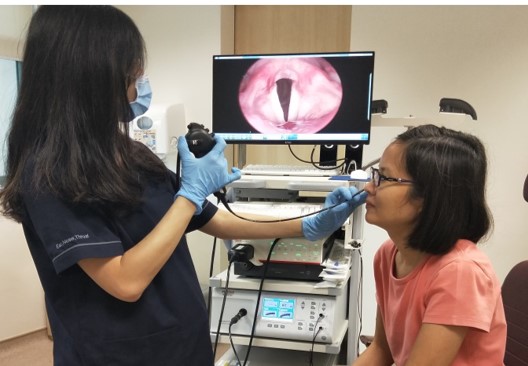What is Laryngopharyngeal Reflux?
Laryngopharyngeal Reflux (LPR) refers to the backflow of stomach acid into the larynx (voice box) or pharynx (throat).
Symptoms
Burning or tickly sensation in the throat
Feeling of a lump in the throat
Needing to clear throat frequently
Frequent bad breath and unpleasant taste in the mouth
Difficulty swallowing
Hoarseness
Chronic cough
Excess phlegm or mucous
Many of these symptoms are worse in the morning, or after a meal. Some people may also experience heartburn or indigestion.
Causes of Laryngopharyngeal Reflux
LPR can be a result of a problem involving the stomach, esophagus (food pipe) or the sphincter muscles that separate the two.
Often in many cases, it is due to lifestyle and dietary habits.
Things that cause or worsen reflux:


How Do I Know if I Have LPR?
Early/ initial diagnosis of LPR is made if you have the typical symptoms/ signs of LPR.
The ENT doctor may examine your throat with a scope to look for signs of reflux irritation and rule out other dangerous causes of your symptoms.
Your throat and voice box may look red and swollen with excessive phlegm due to the acidic irritation.

Flexible
nasoendoscopy at the ENT clinic
In selected cases, a special test known as the '24 Hour PH Probe Study' may be performed by the gastroenterologist to confirm and determine the level of stomach acidic reflux to the throat or voice box area.
How is LPR Treated?
Most cases of LPR do not require medical treatment and can be managed with a change in lifestyle and eating habits.
In selected cases, your doctor may prescribe medications such as proton pump inhibitors, antacids to help lower your gastric acid.
What Can I Do to Minimise LPR?
Lifestyle/ dietary
recommendations:
- Take small, regular meals. Avoid heavy meals.
- Complete your meal at least three hours before lying down
- Quit smoking
- Avoid caffeine, alcohol, food high in fat contents, spicy and citrus fruits/ juices
- Elevate the head of your bed with blocks or use a wedge pillow
- Lose weight if you are overweight – the increased intra-abdominal pressure due to obesity can worsen reflux
- Manage your stress and seek help if required
